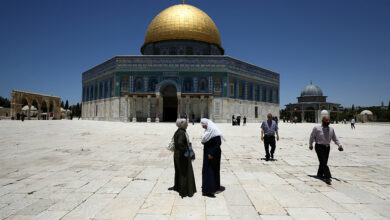Egyptian Minister of Islamic Endowments Mahmoud Hamdy Zaqzouq is not the first to demand that Jerusulem be more open for Muslim visitors. But his recent declaration that he is considering visiting the occupied territories before the end of this year has provoked a storm of controversy.
Although the idea itself has sparked much clamour among opponents, it is however worth weighing up, given the destruction and manipulation of resources on the part of Israeli occupiers, who benefit from the absence of Arabs as it allows them to carry out their plans for Judaization of the city.
Zaqzouq justified a potential visit–which was welcomed by the Israeli press–claiming that it would serve to emphasize the city’s importance for Arabs. He believes such visits must be made even if they require obtaining Israeli visas.
This view was supported by Mahmoud el-Habbash, his Palestinian counterpart, who said he has been championing the idea for thirteen years, labelling it the sole means for protecting Jerusalem and its holy sites.
A question remains unanswered: Which is more beneficial for Jerusalem? Securing a flow of Muslim visitors to help in the reconstruction efforts, in spite of the occupation? Or leaving it to groan in isolation until it wears away with the passage of time?
Facts tell us that Arab and Muslim abstention from visiting the city is a serious matter. The occupiers’ measures of alienation, evacuation and detachment have led to Jerusalem’s population dropping from 260,000 to less than 150,000.
This was confirmed by Hassan Khater, secretary general for the Islamic-Christian Front for Defending Jerusalem and its Holy Places, during a recent forum hosted by the Egyptian Journalists’ Syndicate. Khater said the number of Arab visitors to the city can be counted on one hand, and added that the city’s stores have shut down. According to Khater, fourteen different taxes have been imposed by Israelis on the city’s residents, in a bid to force them out and create space for new settlements.
Hassan Hanafy, professor of philosophy, says refusal to visit Jerusalem can never be a way to protect it. “Of 300 million Muslims around the world, just three million visitors can bring change to Jerusalem’s appearance. This will prove to the world that Jerusalem is Arab, and that such a right cannot be ceded”.
But this argument does not sell among the public. Past and present times are rich in examples showing public rejection of the idea and of its supporters.
Anis Mansour, a famous journalist and writer, visited Israel and Jerusalem more than once and received death threats as a result. Ali Salem, another writer, visited Israel in 1994 after the signing of the Oslo Agreement, and became a target for attacks. Saudi Muslim preacher Mohamed el-Oreify also declared his intention to film an episode of his television show in Jerusalem, but later gave up on the idea due to the objections of anti-normalization advocates.
We can conclude that the majority of the Arab public rejects the idea, accusing its advocates of normalization with Israel, and even apostasy. The Jerusalem commission at the Arab Doctors Union recently issued a statement that invites Muslim and Christian institutions around the Arab world to activate a decree by Grand Sheikh of Al-Azhar Ahmed el-Tayyeb in which he prohibits visiting the city as long as it remains under occupation. El-Tayyeb’s call found an echo at the Orthodox Church in Egypt, which declared that it will only enter the city with Muslims as conquerors after liberating the occupied lands.
The question is: Will Arabs change their stance over time, or will they abandon Jerusalem to Israeli schemes?
Translated from the Arabic Edition.




